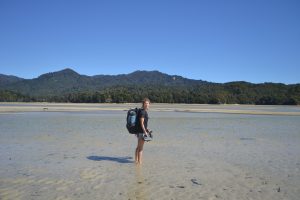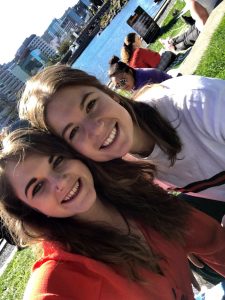Each month, June Sanderson spent an evening at the Fern Leaf Restaurant. It was always a Saturday. If the date fell on an even-number, she wore blue; if it fell on an odd, she twisted her hair into a tight bun at the back of her head. These habits were questions without answers; a reliable topic of thought as she watched herself dress in the full-length mirror. And she didn’t have to worry about the restaurant staff noticing her peculiar vanities. She was welcomed to the Fern Leaf by a different smile almost every visit – workers passing through. Hers was not a town in which people stayed.
June was always ready to leave ten minutes early, despite thoughtful stroking of her eyelashes with the mascara brush. She liked to lengthen her lashes to the point at which the tips were just visible to her own eyes – distraction in blinking. Each time, she would laugh at her own silly haste, as if sharing a joke with the carefree Jamie Oliver resting against her kitchen cupboard, before sitting at the table to wait until six o’clock. An earlier dinner suggested to the world that she could not fill a day.
She would sometimes strive to make herself late, just for the thrill of the rush; to create the illusion that minutes mattered. Her favourite tactic: perfectly aligning her pointed feet with each foot of her long tights, waiting for the perfect moment to plunge toes into the stretchy black material. The tips of her toes shook in anticipation, and she regretted the small sweat on her upper lip. She once wondered whether a condom-wrapped-penis felt like a foot in elasticated tights; even without confirmation, the thought increased her sympathy for the man’s plight. But she was now doomed to an eternity of reprimanding herself for her crudity (at least, if she wanted to continue wearing dresses in the winter). And Time seemed to know her game; she was endlessly disappointed by her own efficiency.
On this particular Saturday, her dress felt a little loose around the edges; she added Coconut Cream cookies to her shopping list, a magnetised paper-pad on the door of the freezer. Plumpness suited her. She was convinced the little excess fed her natural curls and the deep brown colour of her hair. Fisherman Paul – from the time when she liked the company of men – had laughed pityingly at her when she expressed this out-loud, adding: ‘You tell y’self that hun’. She chose the weight over the man. Many women her age withered, like a tree in winter, but June wanted to be bountiful – summer always.
The sky was patchy this evening, blue shapes standing out against greying clouds; the sun in natural spotlights. A resting haze blurred the snow-capped hills, distance adding layers of translucent paint – muffled beauty. As she drove, June cracked the car window to break the silence in her head – an irritated silence which occasionally turned to shouts. But the radio was too hit-and-miss, and conversation unwelcome. She had come to prefer her own company.
The beach ran parallel to the road fifty metres over; the waves barely audible over the rushing of compressed air. She wound the window down a fraction more to mute the water, perturbed by the sonorous confrontation between wind and sea. But where the road branched off into unsealed track, the white foamy horses reared their heads into her sightline. She respected their determination not to be ignored.
At the Fern Leaf, June never sat at the same table twice in a row. She evaluated the advantages and disadvantages of each seat, considering the natural light, volume of music and intensity of smell from the kitchen. But these considerations were a formality: the choice was in her mood. She found her outward decisions far easier to read than her thoughts. And with her choice of seat made, perusal of the menu was simple pretence.
She ordered her food first – calamari and chips – and then went to the bar for a drink.
‘How are you today?’, New Face asks, rushing to June’s aid to prove her competence in the new job. She must only be twenty years old, cheeks flushed with the energy of youth and coastal breeze; white flecks of salt in managed hair; unidentifiable accent.
June responds that she’s well, immediately averting her eyes to browse the shelf of spirits. Another futile exercise of will.
‘Are you local?’, the girl asks. June felt the question challenged the authenticity of her indecision, as if to turn the radio up on the conversation in her own head.
‘Yes. Very.’
One surplus word.
New Face tilts her head and creases her brow – signs of interest. In the past, falsity in the Fern Leaf staff has been painfully transparent. This girl is much more convincing. In another world, June openly compliments her skill.
‘What do you mean?’, the girl asks.
It’s a question June Sanderson is not prepared to answer. Instead she points with a grimace towards a table of teenaged boys. They are making obscene hand-gestures behind the back of another waitress, unaware of – or indifferent to – the attention they are drawing.
The girl responds in the verbal: ‘Ignore them. They’re young, but the same as the rest of us. Just trying to find their cool.’
A response doesn’t come to June in that moment. She asks for a beer with a dash of lemonade and sits down. Shortly, another waitress delivers her plate without a word, but she could have exposed her breasts to the glaring lamps of the restaurant whilst singing a tuneless tune – June would not have noticed. She eats, barely tasting the rubbery calamari and, for the first time, leaves the token lettuce leaf untouched.
After fifteen minutes, New Face approaches to clear her plate. June has covered the excesses of tomato sauce with a sticky paper napkin. She craves tomato sauce to the point of shame, one squeeze too many every time. Knowing the outcome doesn’t change anything.
‘Was everything alright?’ the girl asks.
‘Do you think everyone finds their cool?’. The word ‘cool’ sounded wrong from June’s lips, like a piece of food stuck in a tooth.
New Face thought; the kind of thinking you could see in someone’s eyes. ‘No. Not everyone is happy.’
She took a few steps away from the table, then turned back, her eyes relaxed and fixed on June’s own: ‘But everyone could be.’ And she walked through the swinging door into the kitchen, carrying June’s remnants on a plate.
June left the Fern Leaf Restaurant without her usual chocolate lava cake. She felt full of something more significant than food, an unfamiliar desire to act.
By another diner at the restaurant this Saturday evening, the exchange between June and New Face might have been described as courteous; even minimal. And yet this girl had awakened something in her – this passer through whose eyes were concentrated on the things and people around her. For so long June had lived as far away from herself as possible, attempting to find peace through distance. She had felt insulted by those who passed through her town, as if they objected to her very existence. But it was she that had stopped looking.
Following the pink sky, she stopped her car only when the wheels lost traction in the sand. She opened the car door and stepped to confront the waves, removing her triangle-pointed black pumps and tights. The wind awakened her skin; through the sand every twinge in her leg muscles became a word of thanks, from body to mind.
Her pace didn’t falter as she met the water, her body unaffected by the growing weight of her cotton dress as it began to soak through. She stopped when her hands were submerged; when the waves broke against her stomach. Looking along the length of the empty beach, sand and sea were stained by spots – glaring signs from her eyes not to stare into the sun.
But she was seeing the world. For so long she had been watching the movements of her body, numb to sensation. She had followed her life from the outside, in constant conversation with the complex system inside her own head. To be in her own body – it was simple.
Without conscious thought she plunged into the salty, grey ocean, her heart briefly stopping in cold surprise. She kicked against the tide until her legs and throat burned with appreciation, stopping to spin in the water, to fill her eyes with the darkening sky – constant change.
Coming back to shore, she lay on rough grains, belly down. Her laughter rocked her body; she liked the smell of dirty sand on her lips. She decided to taste more sand: different grains in foreign places, where unknown people had stepped and felt something big. She wanted to talk; to return home with a little bit more life, on the way to finding her cool.
 But even people we met along the walk seemed surprised that two young girls were doing the full 5-day track, carrying our own gear on our backs. Yes, some of the hills were hard work and the bags caused minor shoulder strain. But that’s part of the experience. And swimming in the bluest water imaginable is only made better by weary legs and the prospect of instant noodles. Sometimes the easiest route isn’t the best, whether that’s a package tour which drops your bag at every location, or a hop-on-hop-off bus which allows you to escape interaction with anyone dissimilar to your home friends.
But even people we met along the walk seemed surprised that two young girls were doing the full 5-day track, carrying our own gear on our backs. Yes, some of the hills were hard work and the bags caused minor shoulder strain. But that’s part of the experience. And swimming in the bluest water imaginable is only made better by weary legs and the prospect of instant noodles. Sometimes the easiest route isn’t the best, whether that’s a package tour which drops your bag at every location, or a hop-on-hop-off bus which allows you to escape interaction with anyone dissimilar to your home friends.